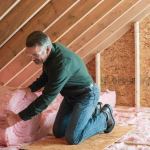Anyone’s life in university is an exciting period. That feeling of getting your first off-campus apartment, there’s a sense of liberation, exhilaration, and maybe even dread. You may be living with friends, but more than ever, you have the power to decide how you want your home to look.
You may save money and keep your home comfortable if you select “energy efficient.” It’s never too early to start saving energy, whether your monthly power cost is included in your entire rent or your landlord prefers you to pay it alone. It’s an opportunity to go to new places, meet new people, and try new activities. Thousands of students, many of whom live away from home for the first time, move into university residence halls or rent private residences each year. Saving energy may not be your priority at university, what with all of the studying and socializing. Still, we believe that everyone can contribute to reducing energy usage and conserving our planet’s resources.
When you are a student at college or university, there is always an ongoing battle to save as much money as possible. You have a limited amount of cash, and it doesn’t grow on trees! The problem with this mindset is that we often neglect the environment to save our pennies. However, reducing energy consumption should be our priority if we want to fight climate change.

What Is the Need to Adopt Energy Efficiency when you Are a Student?
Energy costs are rising; according to Nexus Energy Solutions, gas and electricity rates will be 20% more than they were in 2014.” Reducing your energy use is thus an excellent method to cut down on your living expenses and save money while simultaneously helping the environment!
Students living in University housing can save a significant amount of energy and reduce carbon emissions by making simple modifications. “Even a 5% reduction over 506,000 rooms in residence halls would correspond to savings of £4.7 million in energy and 25,640 tonnes of CO2, according to the Department for Environment, Food and Rural Affairs.”
Ways to Be Energy Efficient as a Student
Reducing your electricity consumption lowers your carbon footprint while saving you money on energy prices. If you’re not using something, make sure it’s turned off at the wall – this includes computers, lamps, and other electronic devices. Another fantastic strategy to save power is to spend less time on devices and get rid of any excessive gadgets. To save electricity and money on charging, try reducing the brightness on your smartphone and turning off 3G/4G/Bluetooth.
- Light bulbs: Late-night studying, parties, and binge-watching are all options. It’s critical to have the lighting right in any student’s house. The only place to begin is with LED light bulbs. They consume substantially less energy and last significantly longer than conventional bulb options. The wide range of strengths and hues are suitable for lamps, decorative string lights, and overhead illumination. Also, keep an eye out for smart light bulbs. Various types connect to your smartphone on the market. That way, you can turn them on and off and alter their colour, all with the touch of a button or even your voice.
- It may seem obvious, but make sure you always switch off the lights when you leave your room. Ensure all lights in common areas, such as kitchens and toilets, are turned off. Adjustable blinds can easily let in light while decreasing glare, so you should attempt to use natural illumination as much as possible to limit the need to turn lights on during the day. Instead of incandescent lights, you might also consider using energy-efficient light bulbs, such as LEDs. Because they utilize less energy, they are significantly more efficient than standard incandescent lights. Low-energy LED lights utilize 90 percent less energy and last 10-20 times longer than traditional lighting.
- Keep your options for cooking open: You’re probably eating on the go and cooking for one as a student. You could be saving money every day if you try these alternatives to a regular oven. Microwave meals may have a poor rep, but the device only consumes about 1,000 watts of power, significantly less than an oven or stovetop. A common rule to remember is that less time equals less energy consumption when it comes to cooking. A plug-in pressure cooker, for example, uses far less energy than a traditional stove or oven because it cooks food considerably faster. It also saves energy by cycling on and off at a lower wattage to maintain heat.
Cooking meals in a microwave rather than an oven is far more environmentally friendly because microwaves don’t take as long to heat up and cook food faster. Microwaves are also much less expensive to operate as a result of this! If you must use the oven, attempt to cook everyone’s food simultaneously and then leave the oven door open once you’re done to assist heat your home. Preparing your meals ahead of time will save you time, energy, and money.
You can cut down on the amount of time you spend using appliances by cooking a large amount of food and consuming it over time. Meal preparation also helps to prevent food waste, which has an impact on your bottom line. If you have roommates with whom you can share the cooking and clean-up duties, meal prepping is even more efficient. Choose recipes that require the stove or oven on frigid winter days since it will warm your kitchen as it cooks your food. Choose recipes that don’t require the oven or stove on hot summer days.
- Get a Slow Cooker: At around 1,000 watts, a slow cooker is another alternative that consumes less energy than an oven. When your food is done, look for models with an inbuilt heat sensor, which will automatically convert to a lower-energy “keep warm” setting.
Anecdotally, I believe this is one of the best college investments you can make. With a slow cooker, you may reduce your food costs to a fraction of what they are currently while still eating well. There are a few things you can’t make in a slow cooker: chilly, curry, soups, lasagna, oats, cobbler, and even brownies. Most importantly, low-cost kitchen gadgets such as slow and pressure cookers use significantly less energy than a typical oven or stovetop.
- Bars of energy: Even when not in use, the gadgets you have plugged in throughout your homes — such as your coffee maker, TV, printer, and gaming consoles – can suck electricity. It is due to “phantom power,” sometimes known as standby power. For example, your microwave consumes more energy to run its clock than it does to heat food over the year, so unplug it when you’re not using it to avoid paying for energy you don’t need. Use power bars to avoid being a victim of wasteful power use. There are various options available but seek ones with a timer or smart strips, which automatically turn off electricity to electronics that are solely in standby mode.
- Mini refrigerator: Besides the obnoxious roommates, sharing a larger refrigerator may be more energy-efficient. Some tiny fridges are energy hogs, consuming nearly as much as larger refrigerators. If you need a small refrigerator for drinks and snacks, seek the ENERGY STAR® logo. These more energy-efficient versions consume a lot less electricity than others. Avoid overfilling your mini-fridge and placing it near a direct heat source, such as a sunny area, to keep it working correctly. If you only clean one thing in your house, make it the refrigerator. Dirty condenser coils can nearly quadruple the energy consumption of your refrigerator! Make a cleaning plan so that you and your roommates may split the labor equitably.
- Window treatments: Okay, it’s tempting to hang a sheet and call it a day. On the other hand, the right window coverings can add a lot to your home while also saving you money. Black-out shades or curtains can help control light (for those late-afternoon naps) and limit the amount of heat that enters your home during the summer. Aluminum blinds are also a good choice for controlling heat and light, and they’re pretty inexpensive. They can let sunlight in during the colder months, reducing the need to crank up the heat. Take advantage of your ceiling fan if you have one. Most types allow you to change the blade orientation to keep cool throughout the summer.
- Turning the water off: Most people leave the water running while brushing their teeth or shaving. Instead, fill a small cup with water before brushing your teeth, turn off the faucet, and rinse with the cup. Fill the sink with water and turn off the faucet until ready for your last rinse. You can save about 3 gallons of water each time you brush or shave by turning off the faucet. Water is a limited and valuable resource. If you prefer long, relaxing showers, take a bath instead and soak for as long. If you want to cut down on how much time you spend in the shower, there are a few options. While shaving and shampooing, you can switch off the water and only use it when rinsing is necessary. If 2-in-1 products work for your skin and hair, such as shampoo that also conditions or body wash that serves as shampoo, you can save time.
- Unplug all of your electronic devices: Make it a habit to unplug your electronics. Unplug the charger as soon as your phone is finished charging. Use a power strip with numerous outlets in places with multiple electronics, such as around your television or kitchen, to effortlessly turn off various electronics at once with the flip of a switch. It will make it easy for you to keep shutting off electronics when not in use.
- Invest in a Thermostat That Can Be Programmed: This may be an unnecessary cost because it is an initial outlay, but they often pay for themselves in as little as a year. So, with a smart thermostat, you’ll see the savings in your energy cost over four years. Simply by programming your thermostat, you can save up to ten percent on your energy bills. Reduce your heating overnight in the cold and pile on the blankets. Only use the air conditioner at home during the summer. Also, remember to clean your air conditioner and heaters regularly to ensure optimal performance.
To Conclude
University is an exciting period full of new experiences and your first chance to live independently away from home. However, it is critical to be aware of your behaviors and their consequences on the environment, especially considering the current state of the environment. As you can see from the examples above, there is a lot you can do to lower your emissions and help the environment while saving money on energy bills!







Leave a Reply